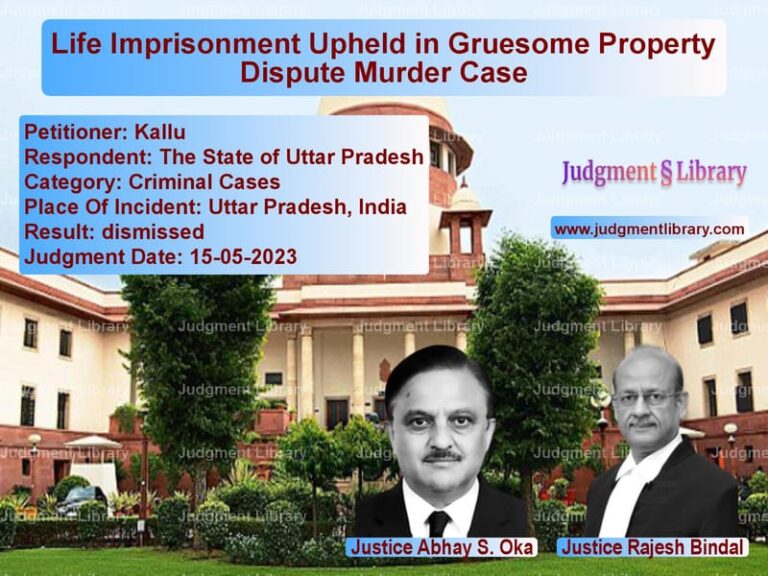Land Tenancy Rights and Purchase Under Maharashtra Tenancy and Agricultural Lands Act: Supreme Court Clarifies Tenant’s Purchase Rights
The case of Vasant Ganpat Padave (D) By LRs & Ors. v. Anant Mahadev Sawant (D) Through LRs & Ors. revolved around the interpretation of Section 32-F of the Maharashtra Tenancy and Agricultural Lands Act, 1948, regarding the purchase rights of tenants when landlords suffer from legal disabilities.
The Supreme Court addressed the question of whether tenants had the right to purchase the land after the death of the landlady, even though they had not notified the authorities within the time prescribed. The Court ultimately ruled in favor of the tenants, allowing them to proceed with their purchase applications.
Background and Key Issues
The dispute arose concerning agricultural land in Ratnagiri, Maharashtra. The legal issues involved:
- Whether the tenant was entitled to purchase the land after the landlady’s death.
- Whether the tenant’s failure to give notice within the statutory period extinguished their purchase rights.
- The applicability of the 1969 amendment that required landlords to notify tenants upon the removal of their legal disability.
Petitioner’s Arguments (Vasant Ganpat Padave & Ors.)
- The landlady, Indirabai, had held the land under the protection of Section 32-G, but the proceedings for the tenant’s purchase were suspended due to her widowhood.
- After her death in 1999, the tenants were unaware of the change in ownership and only learned of it in 2008.
- They argued that the law intended for tenants to have a real opportunity to purchase the land and that their lack of knowledge should not deprive them of their rights.
- They contended that the requirement for the landlord to notify the tenant of their eligibility to purchase should apply to all categories of protected landlords, not just minors.
Respondents’ Arguments (Anant Mahadev Sawant & Ors.)
- The respondents argued that the tenants had lost their right to purchase the land by failing to give notice within the statutory period.
- They relied on previous Supreme Court decisions that held that tenants must adhere strictly to the time limits set by law.
- They contended that the 1969 amendment requiring notification to tenants applied only to minor landlords and not to widows or disabled landlords.
Supreme Court’s Key Observations
1. Legislative Intent and Social Welfare
“The Maharashtra Tenancy and Agricultural Lands Act is a social welfare legislation aimed at transferring land ownership to those who cultivate it.”
The Court emphasized that the Act was intended to benefit tenants by giving them the right to become owners and that procedural technicalities should not defeat that purpose.
2. Notification by Landlords is Essential
“The law recognizes the difficulty tenants may have in knowing when a landlord’s disability has ceased. Requiring notification ensures tenants are not unfairly deprived of their rights.”
The Court held that just as minor landlords must notify tenants upon reaching majority, successors to widows and disabled landlords must also provide such notice.
3. Past Rulings Need Reevaluation
“Previous decisions that ignored the need for tenant notification should be reconsidered in light of legislative intent.”
The Court overruled earlier decisions that held tenants strictly to statutory deadlines without considering their knowledge of the landlord’s status.
Final Judgment
The Supreme Court allowed the appeal and ruled that:
- The tenants’ purchase rights remained valid despite the delay in notification.
- Successors to widowed and disabled landlords must notify tenants of their eligibility to purchase.
- The matter was remanded to the appropriate authorities for processing the tenants’ purchase applications.
Impact of the Judgment
- Tenant Rights Strengthened: Ensures tenants are not unfairly denied purchase rights due to lack of knowledge.
- Clarifies Landlord Obligations: Successors of widows and disabled landlords must notify tenants.
- Ensures Fairness: Balances the rights of landlords and tenants under tenancy law.
This decision reinforces the social welfare objectives of the Maharashtra Tenancy and Agricultural Lands Act and ensures that tenants can exercise their purchase rights effectively.
Petitioner Name: Vasant Ganpat Padave (D) By LRs & Ors..Respondent Name: Anant Mahadev Sawant (D) Through LRs & Ors..Judgment By: Justice R.F. Nariman, Justice R. Subhash Reddy, Justice Surya Kant.Place Of Incident: Ratnagiri, Maharashtra.Judgment Date: 18-09-2019.
Don’t miss out on the full details! Download the complete judgment in PDF format below and gain valuable insights instantly!
Download Judgment: Vasant Ganpat Padave vs Anant Mahadev Sawant Supreme Court of India Judgment Dated 18-09-2019.pdf
Direct Downlaod Judgment: Direct downlaod this Judgment
See all petitions in Property Disputes
See all petitions in Landlord-Tenant Disputes
See all petitions in Judgment by Rohinton Fali Nariman
See all petitions in Judgment by R. Subhash Reddy
See all petitions in Judgment by Surya Kant
See all petitions in allowed
See all petitions in Remanded
See all petitions in supreme court of India judgments September 2019
See all petitions in 2019 judgments
See all posts in Civil Cases Category
See all allowed petitions in Civil Cases Category
See all Dismissed petitions in Civil Cases Category
See all partially allowed petitions in Civil Cases Category







